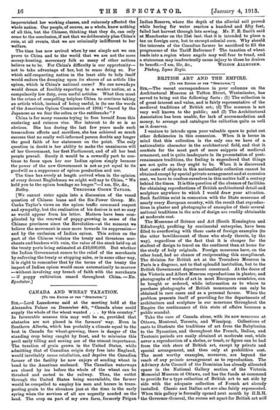CANADA AND WHEAT TAXATION.
[TO THE EDITOR OF THE " SPRCTATOR.".1
Sra,—Lord Lansdowne said at the meeting held at the Alexandra Palace on December 4th, " Canada alone could supply the whole of the wheat wanted . . . by this country." In favourable seasons this may well be so, provided that obstacles are not placed in the farmers' way. Even in Southern Alberta, which has probably a climate equal to the best in Canada for wheat-growing, there is danger of the standing crop being caught by frost, and to minimize this peril early tilling and sowing are of the utmost importance. The taxation of grain grown in the United States, while admitting that of Canadian origin duty free into England, would inevitably cause retaliation, and deprive the Canadian farmer of the facility he now enjoys of sending wheat in bond to the American seaboard. The Canadian waterways are closed by ice before the whole of the wheat can be threshed and carted to the railway. Thus, the outlet through the United States being unavailable, the farmer would be compelled to employ his men and horses in trans- porting grain to the elevators just at the time in the early spring when the services of all are urgently needed on the land. The crop on part of my own farm, formerly Peigan
Indian Reserve, where the depth of the alluvial soil proved while boring for water reaches a hundred and fifty feet, failed last harvest through late sowing. Mr. F. E. Smith said at Manchester on the 21st inst. that it is intended to place a tax on foreign corn, but to exempt colonial corn. Why should the interests of the Canadian farmer be sacrificed to fill the programme of the Tariff Reformer ? The taxation of wheat leads into a region where angels may well fear to tread, and a statesman may inadvertently cause injury to those he desires






















































 Previous page
Previous page